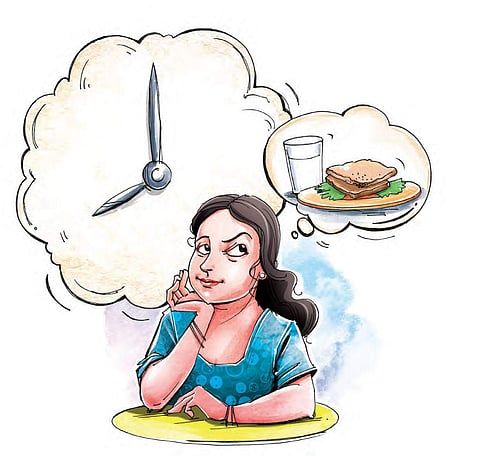

HYDERABAD : The debate around breakfast found a new lease of life recently after Hollywood actor Jennifer Aniston said in an interview that Intermittent Fasting was the secret behind her youthful looks. As part of that routine, the Friends star has a glass of vegetable juice only in lieu of a big, fat breakfast.
And it’s not only Jennifer Aniston. Celebrities including Jennifer Lopez, Beyonce and Nicole Kidman too are said to have sworn by this diet which involves a 16-hour fast and and 8-hour eating window. Though the 8-hour eating window can be followed any time of the day, most prefer to eat an early dinner and skip breakfast.
Not long ago, a report in The Guardian titled ‘How Lobbyists Made Breakfast The Most Important Meal of the Day’, the writer argued that “it was a combination of fear of indigestion, religious moralisation and advertising that helped push the idea of breakfast as the most important meal of the day.”And now, with the popularity of it rising, the importance of eating a large, healthy breakfast is under scrutiny again.
However, nutritionists in the city warn that giving up breakfast altogether might not be a good strategy in the long run. Says Zeenath Fatima, consultant dietician at Continental Hospitals, “Skipping the morning meal can throw off your body’s rhythm of fasting and eating. When you wake up, the blood sugar which your body needs to make your muscles and brain work fully is usually low. Breakfast helps replenish it. If your body doesn’t get that fuel from food, you may feel zapped of energy, and you will be more likely to overeat later in the day.”
Nutritionist Mukta Patil believes that there is no one-size-fit-all strategy.
She says: “Any dieting strategy cannot and must not be generalised. Intermittent Fasting, like many other dieting trends, was coined for a specific purpose.While majority of the celebrities swear by it, it in itself is not the whole truth. Your body only understands caloric deficit for weight loss. It doesn’t understand timing. In the end, what matters is the number of calories taken in, the source of calories and burning of those calories in order to lose weight.”
Fitness expert Dinnaz says, “Intermittent Fasting is not a sustainable model for weight loss. Weight loss, youthful looks etc. are all linked to input and output. The math is very simple. To lose weight, one has to eat less or burn more. When you follow this simple formula, you will never need to look at any other option. Eating nutritious food is more important than the timing of the food.”
What about religious fasting then? Dinnaz explains: “Intermittent Fasting has also come about from our ancient customs of fasting during certain holy days. That is absolutely great and healthy too, as one is doing it for a day or a particular period. On a regular basis, if one is skipping breakfast, they are depriving the body of a lot of nutrients which are required to kickstart your day and provide you with energy. I don’t suggest you do this on a regular basis.”
Mukta too warns that Intermittent Fasting might not be a sustainable way to lose weight. “Many claim that IF increases their fat loss rate. This could be true in the initial days, but it cannot last long. Soon before you even know, the body will adapt to it and will not show fat loss. In fact it may lead to many other health issues like giddiness, acidity, loss of appetite and even fat storage.The only advantagethe celebrities here have is pushing their eating window further ahead in the day, thereby cutting out one meal and having two large meals. This is particularly helpful in sticking to a diet when in caloric deficit.”
What is Intermittent Fasting?
Intermittent fasting involves fasting every day for 12-14 hours, and restricting your daily “eating window” to 10-12 hours. Within the eating window, you can fit in two, three or more meals. Doing this method of fasting can actually be as simple as eating early dinner and not skipping your breakfast. For example, if you finish your last meal at 7 pm and then don’t eat until 9 am the next day, then you are technically fasting for 14 hours between meals and giving a kick start to the day with a healthy breakfast.
---- Zeenath Fatima, dietician at Continental Hospitals
kakoli_mukherjee@newindianexpress.com @KakoliMukherje2